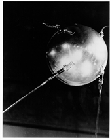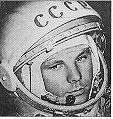Omon Ra (1992)Okay, quick quiz : (1) What was the name of the first man made vehicle to orbit the Earth ? Right, Sputnik
(2) Who was the first man in space ? Right, Yuri Gagarin (April 1961)
(3) Who was the first American ? You got it, Alan Shepard (May 5, 1961)
(4) The first man to walk on the Moon ? Neil Armstrong is correct
(5) The first Russian ?
That's a tough one, huh ? Well, that's because the answer is : no one. The Soviet Union never put a man on the Moon, nor has post-Soviet Russia. That's right, the whole race to the Moon, that massive, costly, era-defining program that JFK started, was almost entirely pointless. The whole time we were merely racing ourselves. How can this be ? you ask yourself. Wasn't this the great peaceful test of the relative strengths of Communism and Capitalism ? Wasn't the Apollo 11 mission a glorious victory for the Free World ? The answer is that : yes, of course, it was. It just wasn't a narrow victory. All of the edge-of-your-seat drama we associate with the "race" was the product of mass delusion. You see, the dirty little secret of the Cold War--actually it's not little, it's quite enormous in its implications--is that the Soviet Union was never a coequal Super Power with the United States. It was always a backwards, inefficient, bureaucratic, corrupt mess. It just happened to be the case that both East and West, conservatives and liberals, Republicans and Democrats, militarists and pacifists, had their own reasons for puffing up the Soviet Union, for overestimating its achievements and its capabilities. Soviet leaders had to convince their own people that there was some reason for the squalor they lived in. Western leaders wanted to justify their willingness to allow Communism to continue to subjugate all of Eastern Europe. Militarists wanted money spent on their weapons systems. Pacifists wanted to scare people. Conservatives wanted a bogeyman. Liberals needed to believe Communism could work. Seemingly everyone had a vested interest in the myth of Soviet power. Now, normally, the collapse of the Soviet Union would have punctured such a myth, were it not for the unfortunate fact that Left and Right continue to have their own reasons for maintaining it. The Right needs the myth in order to burnish the greatness of Ronald Reagan. After all, if the bear was really a paper tiger, it diminishes the Gipper's achievements. Meanwhile, for the Left to acknowledge the myth would require them to concede that the Soviet Union was a disaster from the get go, that rather than being a tenable system which Stalin corrupted or which failed to innovate in its later years, the system was simply stillborn, and even at its moment of seeming parity with the West was actually quite primitive. Oddly enough, it is in Russia itself that the myth has faced its stiffest challenge. In his great book Lenin's Tomb, David Remnick makes the compelling case that it was in large part Gorbachev's loosening of speech restrictions during perestroika which, quite accidentally, led to the fall of Communism. Gorbachev expected intellectuals to criticize the Soviet Union as it existed at that moment, and thought that this critique would help him to reform Communism. Instead, dissidents dismissed the historic tendency to blame all of the USSR's ills on Stalin and attacked Lenin, the Russian Revolution itself, and the very origins of the Soviet system. Where Gorbachev expected help in repainting the edifice, they blew up the foundation of the structure. And the Wall came tumbling down.... Now comes Victor Pelevin, widely considered to be one of the best of the Post-Soviet Russian writers, and his short novel Omon Ra is a truly devastating fable of the Soviet Union. From childhood Omon Krizomazov, named for the Interior Ministry riot police, dreams of escaping the grim reality of Soviet life by soaring skywards. He gets the chance to realize his dreams when he is chosen not merely to become a cosmonaut but to actually go on the first Soviet moon landing. But the dream turns into a nightmare when he is told that he is training for a suicide mission, because the Soviets do not have the technological expertise needed to bring a landing vehicle back from the Moon. In fact it turns out that each space launch consumes a number of lives because every stage of the rocket must be released by hand, by a cosmonaut decoupling the section he's riding in, because Soviet scientists haven't been able to automate the systems. Omon agrees, not that he's really given a choice, to participate in the deception, as his superiors explain to him that the lie he will help perpetrate is necessary to vindicate the larger truth of Marxism. This is a marvelous satire, one that is just as subversive here in the West as it continues to be in a Russia, where a frighteningly large segment of the populace views the Soviet era as a Golden Age. The writing--for those of you, like me, who frequently find Russian Literature to be impenetrable--is totally accessible. Think The Right Stuff as imagined by Christopher Buckley. I can't recommend this one strongly enough. Readers of the World unite! You have nothing to lose but your misconceptions about the past fifty years of World history. (Reviewed:) Grade: (A) Tweet Websites:-WIKIPEDIA: Victor Pelevin -PROFILE: The mysterious novelist who foresaw Putin’s Russia – and then came to symbolise its moral decay: Victor Pelevin made his name in 90s Russia with scathing satires of authoritarianism. But while his literary peers have faced censorship and fled the country, he still sells millions. Has he become a Kremlin apologist? (Sophie Pinkham, 1/07/25, The Guardian) -REVIEW: of Life of Insects (Leah Cutter, Strange Horizons) Book-related and General Links: -Victor Pelevin's stories in English translation (Victor Zhorin) -ETEXT : Victor Pelevin. Omon Ra Translated from Russian by Yuri Machkasov -EXCERPT : First Chapter of The Blue Lantern -EXCERPT : First Chapter of Buddha's Little Finger by Victor Pelevin -EXCERPT : First Chapter of The Life of Insects -EXCERPT : First Chapter of A Werewolf Problem in Central Russia -INTERVIEW : 'I never was a hero' : Viktor Pelevin (April 30, 2000, The Observer) -PROFILE : Gogol À Go-Go : By chronicling the garish excesses of contemporary Russia, the novelist Victor Pelevin has earned the scorn of the Moscow literary world and the adulation of the country's youth. (JASON COWLEY, NY Times Magazine) -PROFILE : Year in Review 2001: biography Pelevin, Viktor (Robert Rauch, Encyclopædia Britannica) -ARTICLE : The visit of Russian author Victor Pelevin to the University of Bristol (Sarah Hudspith) -ESSAY : The speculative fiction of Patrick O'Leary and Victor Pelevin : a book review by Richard Seltzer -ARCHIVES : pelevin (Salon) -ARCHIVES : pelevin (NY Review of Books) -ARCHIVES : "victor pelevin" (Find Articles) -REVIEW : of OMON RA By Victor Pelevin Translated by Andrew Bromfield (RICHARD BERNSTEIN, NY Times) -REVIEW : of OMON RA By Victor Pelevin (Tom Ferrell, NY Times Book Review) -REVIEW : Jun 25, 1998 John Bayley: Under the Overcoat, NY Review of Books The Life of Insects by Victor Pelevin and translated from the Russian by Andrew Bromfield Omon Ra by Victor Pelevin and translated from the Russian by Andrew Bromfield -REVIEW : of Omon Ra (RICHARD DYER, The Boston Globe) -REVIEW : of Omon Ra (Dwight Garner, Salon) -REVIEW : of Omon Ra (Carlin Romano, Knight-Ridder Newspapers) -REVIEW : of Omon Ra (Fin Keegan, 2nd Circle) -REVIEW : of Omon Ran (Reena Jana, Wired) -REVIEW : of THE BLUE LANTERN And Other Stories. By Victor Pelevin. Translated by Andrew Bromfield (Ken Kalfus, NY Times Book Review) -REVIEW : of The Blue Lantern (Oliver Reddy, New Statesman) -REVIEW : of The Blue Lantern (D.S. Black, San Francisco Bay Guardian) -REVIEW : of The Blue Lantern (Margaret Ziolkowski, World Literature Today) -REVIEW : of THE LIFE OF INSECTS By Viktor Pelevin Translated by Andrew Bromfield (RICHARD BERNSTEIN, NY Times) -REVIEW : of The Life of Insects (MICHAEL UPCHURCH, NY Times Book Review) -REVIEW : of Life of Insects ( Jelena Petrovic , City Pages) -REVIEW : of The Life of Insects (Megan Harlan, Boston Phoenix) -REVIEW : of The Life of Insects (James McNamara, Yale Review of Books) -REVIEW : of Life of Insects (Leah Cutter, Strange Horizons) -REVIEW : of Life of Insects (Steven E. Alford) -REVIEW : of The Life of Insects (Joachin T. Baer, World Literature Today) -REVIEW : of The Life of Insects (James Wood, Artforum) -REVIEW : of A WEREWOLF PROBLEM IN CENTrAL RUSSIA And Other Stories. By Victor Pelevin (Richard Lourie, NY Times Book Review) -REVIEW : of Werewolf Problem in Central Russia (Jesse Berrett, City Pages) -REVIEW : of A Werewolf Problem (Lachlan Mackintosh, FFWD) -REVIEW : of A Werewolf Problem (Francesca French, Willamette Week) -REVIEW : of A Werewolf Problem (MAGGIE TRAPP, Fabula Magazine) -REVIEW : of A Werewolf Problem in Central Russia (Philippe D Radley, World Literature Today) -REVIEW : of The Clay Machine-Gun (Oliver Reddy, New Statesman) -REVIEW : of The Clay Machine-Gun (C. J. McCarthy, 2nd Circle) -REVIEW : of The Clay Machine-Gun (John Dolan, The Exile) -REVIEW : of The Clay Machine-Gun (Alex Dunne, Blue Ear) -REVIEW : of The Clay Machine-Gun (Bob Halliday, Mappa Mundi) -REVIEW : of Buddha's Little Finger By Victor Pelevin. Translated by Andrew Bromfield (Scott Bradfield, NY Times Book Review) -REVIEW : of Buddha's Little Finger by Victor Pelevin (Craig Offman, Salon) -REVIEW : of Buddha's Little Finger by Victor Pelevin (James Lough, The Denver Post) -REVIEW : of Buddha's Little Finger by Victor Pelevin (Richard Seltzer) -REVIEW : of Buddha's Little Finger by Victor Pelevin (Spring Harbor Press) -REVIEW : of Buddha's Little Finger by Victor Pelevin (Francisca Goldsmith, Library Journal) -REVIEW : of Babylon by Victor Pelevin ( Steven Poole, April 22, 2000, The Guardian) -REVIEW : of Babylon (Elinor Shields, TIME) -REVIEW : of Babylon (Suzanne Kiernan, Sydney Morning Herald) -REVIEW : of Babylon by Victor Pelevin (Tony Wood, bookonline uk) -REVIEW : of Generation "P" (David McFayden, World Literature Today) -REVIEW : of Generation "P" by Victor Pelevin (Gregory Freidin, Foreign Policy) -AWARD : Little Booker 1993 - for the best collection of stories. Winner: Victor Pelevin, The Blue Lantern SOVIET SPACE PROGRAM :
GENERAL :
|
Copyright 1998-2015 Orrin Judd





